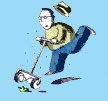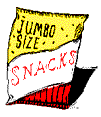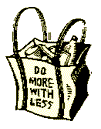Solid Waste and Recycling - Yard Waste
Solid Waste and Recycling - Yard Waste
 St. Clair County Landfill does not accept yard waste.
St. Clair County Landfill does not accept yard waste.
Composting
Composting is the natural process of decomposing organic material, like leaves or grass clippings. Bacteria and insects consume this material leaving nutrient rich soil. Composting has been going on in forests since the beginning of time and can easily be done in your backyard. A major advantage of composting for any gardener is that the home-grown compost can be used instead of commercial fertilizers and mulches.
Grasscycling
Grasscycling is the natural practice of leaving clippings on the lawn when mowing. This can save time, money and other resources like landfill space. The clippings quickly decompose, returning nutrients to the soil. Proper turf management, in conjunction with the practice of grasscycling, can reduce water and fertilizer requirements, mowing time, and disposal costs. By grasscycling you can help Mow Down Pollution!
Facts About Composting
Recycling Your Grass Clippings
Food Waste Reduction
Vermicomposting is composting food waste using worms. Composting through the use of worms in your own backyard, or school, is a very simple way to turn garbage into a useful product called worm castings that can help brighten up the flower beds and improve the food output of the vegetable garden. Composting using worms is also a great children's science project!
Links to Other Worm Composting Sites
· Worm Digest
· Worm Woman's Web Site
· Vermicomposting Resources
· A Guide Vermicomposting
 Look for Less Packaging
Look for Less Packaging
Of all the garbage we generate, 1/3 is packaging that gets thrown away immediately. Buy in bulk or concentrate form when possible, and avoid excessive packaging layers. Avoid disposable products such as juice boxes or single serving snacks. Since almost all products require some packaging, choose ones with packaging that is recyclable.
 Use a Cloth Shopping Bag
Use a Cloth Shopping Bag
Paper or Plastic? Bring your own cloth bags to the grocery store and you won't have to make that tough choice. Cloth bags are stronger than paper and plastic bags, and won't contribute to the tons of unnecessary trash in our landfills since you can use them over and over again.
Purchase Reusable Containers
 Buy groceries like juice, lunch supplies and condiments with reusable containers in mind. Juices can be purchased in concentrate form to be mixed in your own reusable containers. You can reduce a tremendous amount of lunch waste by avoiding single serving containers. Reusing also extends a product's life span. When we reuse products, we don't have to waste valuable natural resources in their creation, and a substantial volume of waste is diverted from the landfills. There are four ways you can practice reuse in your home:
Buy groceries like juice, lunch supplies and condiments with reusable containers in mind. Juices can be purchased in concentrate form to be mixed in your own reusable containers. You can reduce a tremendous amount of lunch waste by avoiding single serving containers. Reusing also extends a product's life span. When we reuse products, we don't have to waste valuable natural resources in their creation, and a substantial volume of waste is diverted from the landfills. There are four ways you can practice reuse in your home:
· Avoid disposable products
· Find new uses for common household items
· Purchase durable, long-lasting products
· Find a second life for durable products
Buy Recycled
Purchasing products made with recycled material helps turn those cans, bottles, and paper collected at curbside into products we can use every day. The packaging on many products lists whether recycled material is used. Buying these products helps "close the loop," and because these products use fewer resources, you will be helping the environment. If you're not buying recycled products, you're really not recycling.